罗兰·巴特的符号学理论探析
符号学原理 罗兰
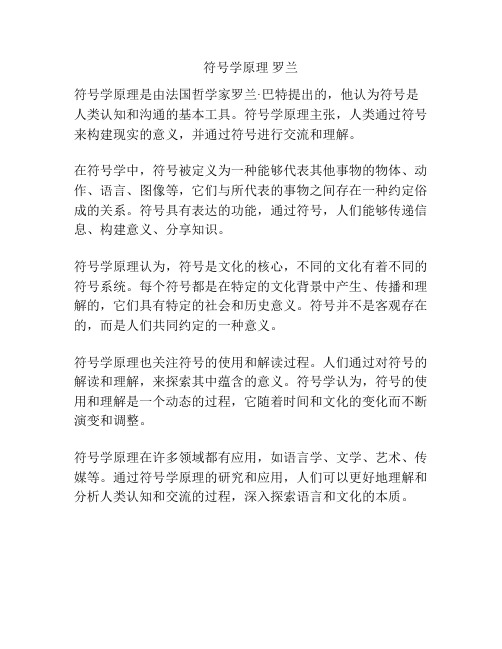
符号学原理罗兰
符号学原理是由法国哲学家罗兰·巴特提出的,他认为符号是人类认知和沟通的基本工具。
符号学原理主张,人类通过符号来构建现实的意义,并通过符号进行交流和理解。
在符号学中,符号被定义为一种能够代表其他事物的物体、动作、语言、图像等,它们与所代表的事物之间存在一种约定俗成的关系。
符号具有表达的功能,通过符号,人们能够传递信息、构建意义、分享知识。
符号学原理认为,符号是文化的核心,不同的文化有着不同的符号系统。
每个符号都是在特定的文化背景中产生、传播和理解的,它们具有特定的社会和历史意义。
符号并不是客观存在的,而是人们共同约定的一种意义。
符号学原理也关注符号的使用和解读过程。
人们通过对符号的解读和理解,来探索其中蕴含的意义。
符号学认为,符号的使用和理解是一个动态的过程,它随着时间和文化的变化而不断演变和调整。
符号学原理在许多领域都有应用,如语言学、文学、艺术、传媒等。
通过符号学原理的研究和应用,人们可以更好地理解和分析人类认知和交流的过程,深入探索语言和文化的本质。
罗兰巴特符号学原理
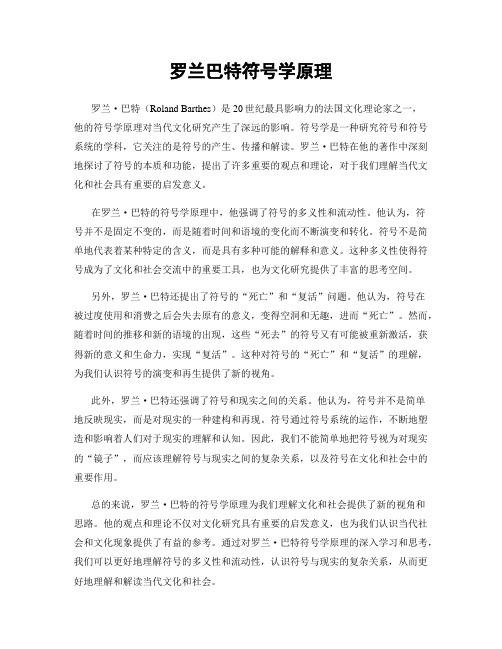
罗兰巴特符号学原理罗兰·巴特(Roland Barthes)是20世纪最具影响力的法国文化理论家之一,他的符号学原理对当代文化研究产生了深远的影响。
符号学是一种研究符号和符号系统的学科,它关注的是符号的产生、传播和解读。
罗兰·巴特在他的著作中深刻地探讨了符号的本质和功能,提出了许多重要的观点和理论,对于我们理解当代文化和社会具有重要的启发意义。
在罗兰·巴特的符号学原理中,他强调了符号的多义性和流动性。
他认为,符号并不是固定不变的,而是随着时间和语境的变化而不断演变和转化。
符号不是简单地代表着某种特定的含义,而是具有多种可能的解释和意义。
这种多义性使得符号成为了文化和社会交流中的重要工具,也为文化研究提供了丰富的思考空间。
另外,罗兰·巴特还提出了符号的“死亡”和“复活”问题。
他认为,符号在被过度使用和消费之后会失去原有的意义,变得空洞和无趣,进而“死亡”。
然而,随着时间的推移和新的语境的出现,这些“死去”的符号又有可能被重新激活,获得新的意义和生命力,实现“复活”。
这种对符号的“死亡”和“复活”的理解,为我们认识符号的演变和再生提供了新的视角。
此外,罗兰·巴特还强调了符号和现实之间的关系。
他认为,符号并不是简单地反映现实,而是对现实的一种建构和再现。
符号通过符号系统的运作,不断地塑造和影响着人们对于现实的理解和认知。
因此,我们不能简单地把符号视为对现实的“镜子”,而应该理解符号与现实之间的复杂关系,以及符号在文化和社会中的重要作用。
总的来说,罗兰·巴特的符号学原理为我们理解文化和社会提供了新的视角和思路。
他的观点和理论不仅对文化研究具有重要的启发意义,也为我们认识当代社会和文化现象提供了有益的参考。
通过对罗兰·巴特符号学原理的深入学习和思考,我们可以更好地理解符号的多义性和流动性,认识符号与现实的复杂关系,从而更好地理解和解读当代文化和社会。
符号学·文学·文化——罗兰·巴特的符号学思想研究

为 “ 当代法 国思 想 界的杂 家 ” 。 巴特思 想 体 系 复杂 多 变 的特 点 ,决定 了 国内外 学 术 界在 巴特 的 身 份定 位 、思想 分期 、理 论体 系构 建等 研究 上难 以达 成 共识 、甚 至衍 生 出诸 多分 歧 和误解 ,进 一
步 加大 了正 确认 识 巴特及 其思 想 的难度 ,使 巴特 思想 研究 成 为学 术界一 座极 富魅 力 的迷宫 。针 对 这 一现 状 ,本文 依据 国 内外学 术界 对于 巴特 思想 分期 的权 威性 划分 ,通 过研 究他 在各个 思 想 阶段
收 稿 日期 :2 1 -3 1 0 1 .l 0
本 文 系 湖 南 省 社 科 基 金项 目 “ 兰 ・巴特 符 号 学 思 想 研 究 ” ( 目批 准 号 :0 Y A 6 ) 的 阶 段 性 成 果 。 罗 项 9 B 07
①
R ln ate 在 中 文 中 的译 名 没 有 统 一 ,有 “ 朗 ・巴 特 ” “ 兰 ・巴尔 特 ” 和 “ 兰 ・巴 特 ” 等 不 同 的 形 式 ,本 o dB r s a h 罗 、 罗 罗 文 统 一 采用 “ 罗兰 ・巴特 ” 但 是 在 引 用其 他 文 献 资 料 时 仍 保 持 引 文 的Βιβλιοθήκη 表 达 。不 作 修 改 。 。
宫。在 巴特 学术生 涯的 第一 阶段 ,“ 零度 写 作” 和 “ 解神 话” 这 两个 关键 词 在 巴特 的 思
想体 系 中得 以 凸显 ,前者 以文 学 为研 究对 象 ,后 者 则从 日常 大众 文化表征 入 手 来批 判 资
本 主 义社会 意识 形 态。进入 学术 生涯 的第二 阶段 ,巴特 的符 号学研 究迎 来 了高峰期 ,这 段 时期 也被 学界 称为 巴特 学 术 生 涯 中的 “ 号 学 阶段 ” 符 。进 入 学 术 生 涯的 第 三 阶段 后 , 巴特 思想呈 现 出 多样 性 、解构 性 等特 点。在 第 四阶段 ,巴特 的解构 主 义文 学、 文化符 号 学研 究继 续往 纵 深发展 ,除 了在 思想和 内容 上践 行 解构主 义精 神之 外 , 巴特还 积极 寻 求
罗兰8226;巴特符号学理论建构及其意义――《符号学原理》解读

罗兰•巴特符号学理论建构及其意义――《符号学原理》解读摘要:罗兰∙巴特是法国当代著名文学思想家和理论家,结构主义运动代表人物之一。
他的符号学理论是在结构主义基础上建构,受索绪尔结构语言学的直接影响。
他所建立的二级意指符号系统是他对符号理论的重要贡献,他的符号理论对整个符号学以及人文学科的研究产生了深远的影响和学术价值。
关键词:罗兰∙巴特符号含蓄意指元语言巴特一生研究领域颇广,但对符号学的研究贯穿他的一生。
他曾在第一届国际符号学会上,将他的一生定位是对符号的历险。
本文主要通过对巴特《符号学原理》的解读,对巴特的符号理论进行简单的梳理,以求对巴特的符号学思想有个宏观的把握和理解。
一、巴特符号理论建构理论基础(一)结构主义思潮巴特作为法国结构主义运动代表人物之一,他的符号学理论的提出受到了结构主义思潮的很大影响。
皮亚杰在《结构主义》提出:一个结构包括了三个特性:整体性、转换性和自身调整性。
结构是一个相对封闭与独立自足的整体。
结构主义是对俄国形式主义和新批评文论思想的推进。
它与形式主义和新批评一样,依然注重文学作品内部的研究。
尤其注重通过文本各要素与整体结构的关系来探讨作品的意义。
巴特符号学理论的建构显示出了结构主义方法论的特色。
(二)结构主义语言学以索绪尔为代表的结构主义语言学理论对巴特符号理论的建构有着直接的影响。
索绪尔提出的语言学概念被巴特加以吸收借鉴。
他在书中严格区分了语言和言语。
他认为语言是一个完整的符号系统,它是由具有音响意义的能指和具有概念意义的所指构成,从而生成意义。
语言学研究是共时性的而非历时性。
索绪尔的“语言与言语”、“能指与所指”等概念也成为巴特符号原理的基本概念。
索绪尔以及他的追随者叶尔姆斯列夫的语言学思想是巴特符号学思想的启蒙和向导。
二、巴特符号理论建构(一)语言结构和言语语言和言语是索绪尔结构语言学研究的核心思想,巴特符号学理论引入了索绪尔关于言语和语言的概念,并加以推进。
罗兰·巴尔特的“现代神话”理论
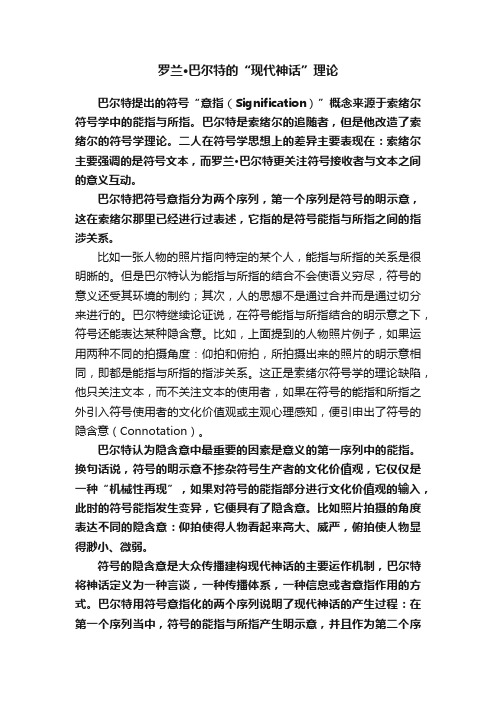
罗兰·巴尔特的“现代神话”理论巴尔特提出的符号“意指(Signification)”概念来源于索绪尔符号学中的能指与所指。
巴尔特是索绪尔的追随者,但是他改造了索绪尔的符号学理论。
二人在符号学思想上的差异主要表现在:索绪尔主要强调的是符号文本,而罗兰·巴尔特更关注符号接收者与文本之间的意义互动。
巴尔特把符号意指分为两个序列,第一个序列是符号的明示意,这在索绪尔那里已经进行过表述,它指的是符号能指与所指之间的指涉关系。
比如一张人物的照片指向特定的某个人,能指与所指的关系是很明晰的。
但是巴尔特认为能指与所指的结合不会使语义穷尽,符号的意义还受其环境的制约;其次,人的思想不是通过合并而是通过切分来进行的。
巴尔特继续论证说,在符号能指与所指结合的明示意之下,符号还能表达某种隐含意。
比如,上面提到的人物照片例子,如果运用两种不同的拍摄角度:仰拍和俯拍,所拍摄出来的照片的明示意相同,即都是能指与所指的指涉关系。
这正是索绪尔符号学的理论缺陷,他只关注文本,而不关注文本的使用者,如果在符号的能指和所指之外引入符号使用者的文化价值观或主观心理感知,便引申出了符号的隐含意(Connotation)。
巴尔特认为隐含意中最重要的因素是意义的第一序列中的能指。
换句话说,符号的明示意不掺杂符号生产者的文化价值观,它仅仅是一种“机械性再现”,如果对符号的能指部分进行文化价值观的输入,此时的符号能指发生变异,它便具有了隐含意。
比如照片拍摄的角度表达不同的隐含意:仰拍使得人物看起来高大、威严,俯拍使人物显得渺小、微弱。
符号的隐含意是大众传播建构现代神话的主要运作机制,巴尔特将神话定义为一种言谈,一种传播体系,一种信息或者意指作用的方式。
巴尔特用符号意指化的两个序列说明了现代神话的产生过程:在第一个序列当中,符号的能指与所指产生明示意,并且作为第二个序列的能指,神话就产生于符号的第二序列意义之中。
巴尔特 《符号学》原理 读书笔记
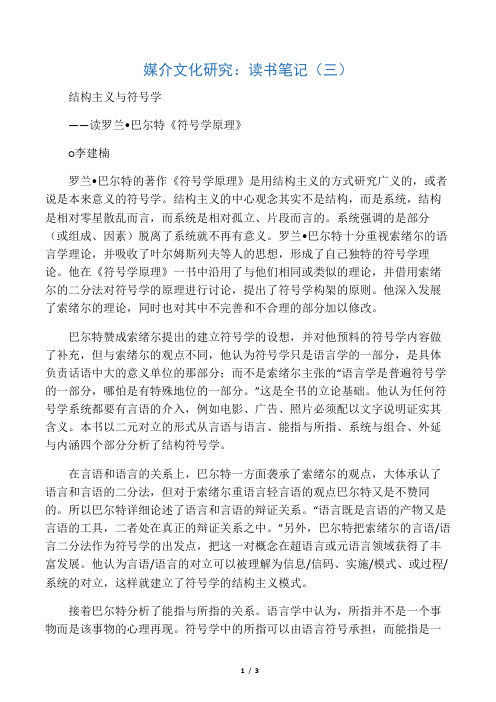
媒介文化研究:读书笔记(三)结构主义与符号学——读罗兰•巴尔特《符号学原理》○李建楠罗兰•巴尔特的著作《符号学原理》是用结构主义的方式研究广义的,或者说是本来意义的符号学。
结构主义的中心观念其实不是结构,而是系统,结构是相对零星散乱而言,而系统是相对孤立、片段而言的。
系统强调的是部分(或组成、因素)脱离了系统就不再有意义。
罗兰•巴尔特十分重视索绪尔的语言学理论,并吸收了叶尔姆斯列夫等人的思想,形成了自己独特的符号学理论。
他在《符号学原理》一书中沿用了与他们相同或类似的理论,并借用索绪尔的二分法对符号学的原理进行讨论,提出了符号学构架的原则。
他深入发展了索绪尔的理论,同时也对其中不完善和不合理的部分加以修改。
巴尔特赞成索绪尔提出的建立符号学的设想,并对他预料的符号学内容做了补充,但与索绪尔的观点不同,他认为符号学只是语言学的一部分,是具体负责话语中大的意义单位的那部分;而不是索绪尔主张的“语言学是普遍符号学的一部分,哪怕是有特殊地位的一部分。
”这是全书的立论基础。
他认为任何符号学系统都要有言语的介入,例如电影、广告、照片必须配以文字说明证实其含义。
本书以二元对立的形式从言语与语言、能指与所指、系统与组合、外延与内涵四个部分分析了结构符号学。
在言语和语言的关系上,巴尔特一方面袭承了索绪尔的观点,大体承认了语言和言语的二分法,但对于索绪尔重语言轻言语的观点巴尔特又是不赞同的。
所以巴尔特详细论述了语言和言语的辩证关系。
“语言既是言语的产物又是言语的工具,二者处在真正的辩证关系之中。
”另外,巴尔特把索绪尔的言语/语言二分法作为符号学的出发点,把这一对概念在超语言或元语言领域获得了丰富发展。
他认为言语/语言的对立可以被理解为信息/信码、实施/模式、或过程/系统的对立,这样就建立了符号学的结构主义模式。
接着巴尔特分析了能指与所指的关系。
语言学中认为,所指并不是一个事物而是该事物的心理再现。
符号学中的所指可以由语言符号承担,而能指是一中介体,能指的实体始终是物质的。
罗兰巴特 符号的意指作用 案例

罗兰·巴特(Roland Barthes)是法国著名的文化批评家、语义学家和符号学家。
他对符号的研究在当今的文化研究领域具有重要意义。
本文将从罗兰·巴特的符号学理论出发,探讨符号的意指作用,并结合具体案例进行分析。
一、罗兰·巴特的符号学理论罗兰·巴特在《象征形式》一书中提出了符号学的概念,他认为符号在人类的日常生活中具有重要的意义。
在巴特的理论中,符号被定义为“意味着其他某物的事物”,这表明符号不仅是一种具体的物质形式,更重要的是它所代表的意义。
巴特将符号分为指示符号和象征符号两种类型,指示符号是直接代表某种事物的物质形式,而象征符号则是通过一定的约定和文化背景来赋予特定的意义。
二、符号的意指作用在符号学理论中,符号的意指作用是指符号所代表的具体意义和引起的联想。
符号的意指作用不仅涉及到其自身的形态和结构,更重要的是它所指向的世界以及人们在接收符号时产生的心理活动。
符号的意指作用是一种非常复杂的心理过程,它受到人们个体差异、文化背景、语境等多种因素的影响。
研究符号的意指作用需要考虑到人们的感知和认知过程,以及符号所处的具体环境和语境。
三、符号的意指作用案例分析为了更好地理解符号的意指作用,我们可以结合具体的案例进行分析。
以道路交通标志为例,红色圆形代表"停止",绿色圆形代表"通行",这些标志在交通行驶中具有明确的指示作用。
然而,在不同的文化环境中,这些颜色和形状可能会被赋予不同的意义,比如在我国红色是吉祥的颜色,在西方国家却代表危险。
这说明符号的意指作用是受到文化背景和语境的影响的。
另外一个例子是商标符号的意指作用。
比如著名的耐克商标"Swoosh",这个标志由一个向右倾斜的勾形图案组成,代表着运动、速度和动感。
耐克公司通过这个标志向用户传递了自己的品牌形象和核心价值观。
这个符号在用户心中产生了丰富的联想和情感,成为了耐克品牌的重要标识。
罗兰·巴特的符号学理论探究
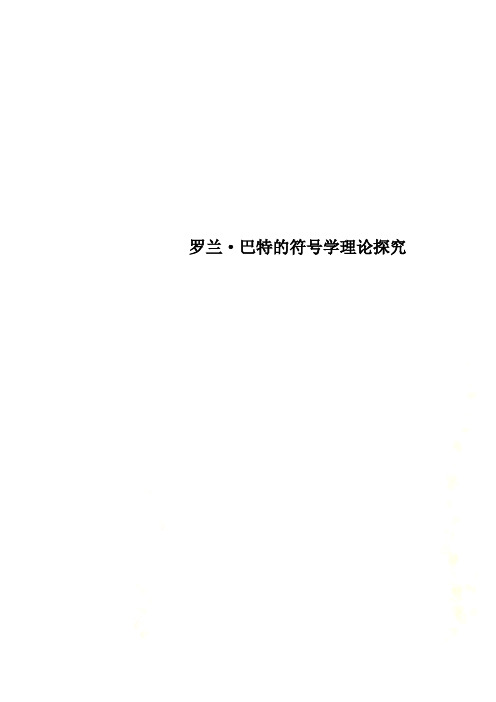
罗兰·巴特的符号学理论探究罗兰·巴特的符号学理论探究2010-08-05 13:53来源: 《批评家》杂志作者:杨简茹网友评论0 条浏览次数176摘要:符号学的内质可以各有不同。
巴特认为,多数符号学系统都具有一种本来不介入意指(signification)作用的表达内质,而社会往往把一些日常用品用于意指目的,如衣服本来是用于御寒的,食物是用来果腹的,然而它们也可以被用来进行意指。
比如雨衣是为了防雨的,但这种运用与某种气象状况的符号是不可分的。
因此,意指及其符号具有隐喻性特征。
以《流行体系》为例自20世纪以来,流行文化在全球范围内的迅速传播引起了诸多理论家的兴趣。
他们透过缤纷的时装、绚丽的广告,看到其背后隐藏的神秘的文化氛围。
法国的文学家、理论家、批评家罗兰·巴特(Roland Barthes)对于流行文化的研究给了我们许多启发。
从历史上看,近现代一些美学家开始尝试将符号学观念运用于文学艺术领域,为巴特的符号学研究奠定了基础。
由于巴特不断将符号学的研究扩展到服装、摄影、日常生活诸领域,巴特由文学界的影响走的更远。
他的工作某种意义上是一种类似解放的工作,把对象从平庸中解放出来,从常识中解放出来,他让我们领会如何重新看待我们的周遭,如何用不同于常识和习惯的眼光看待一切。
符号学理论是巴特的结构主义阶段最重要的部分,本文即选择符号学时期的巴特,以《流行体系——符号学与服饰符码》[1]为例对于他的理论形成过程进行求证和分析,意在将他的符号学理论置入文化实践中进行考察。
一、《流行体系》的写作缘起1967年,巴特发表了《流行体系》,与以前的著作相比,其中写作的成分更少,科学成分增加。
作为马克思主义者、符号学家、现代文学批评家和结构主义者的巴特功成名就。
他与米歇尔·福柯、雅克·拉康以及列维-斯特劳斯被誉为“四个火枪手”[2]。
“结构”一词最初只具有建筑学意义,直到“结构主义”出现,其应用于全部人文学科主要得益于语言学领域的发展。
编织形象的神话罗兰·巴特符号学中的形象问题
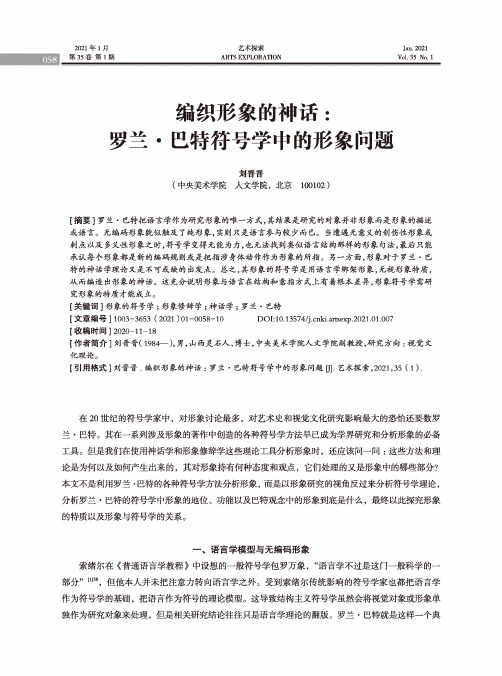
2021年1月第35卷第1期Jan.2021Vol.35No.1艺术探索ARTS EXPLORATION编织形象的神话:罗兰•巴特符号学中的形象问题刘晋晋(中央美术学院人文学院,北京100102)[摘要]罗兰•巴特把语言学作为研究形象的唯一方式,其结果是研究的对象并非形象而是形象的描述或语言。
无编码形象貌似触及了纯形象,实则只是语言参与较少而已。
当遭遇无意义的创伤性形象或刺点以及多义性形象之时,符号学变得无能为力,也无法找到类似语言结构那样的形象句法,最后只能承认每个形象都是新的编码规则或是把指涉身体动作作为形象的所指。
另一方面,形象对于罗兰•巴特的神话学理论又是不可或缺的出发点。
总之,其形象的符号学是用语言学绑架形象,无视形象特质,从而编造出形象的神话。
这充分说明形象与语言在结构和意指方式上有着根本差异,形象符号学需研究形象的特质才能成立。
[关键词]形象的符号学;形象修辞学;神话学;罗兰•巴特[文章编号]1003-3653(2021)01-0058-10D01:10.13574/ki.artsexp.2021.01.007[收稿时间]2020-11-18[作者简介]刘晋晋(1984—),男,山西灵石人,博士,中央美术学院人文学院副教授,研究方向:视觉文化理论。
[引用格式]刘晋晋.编织形象的神话:罗兰•巴特符号学中的形象问题Q].艺术探索,2021,35(1).在20世纪的符号学家中,对形象讨论最多,对艺术史和视觉文化研究影响最大的恐怕还要数罗兰■巴特。
其在一系列涉及形象的著作中创造的各种符号学方法早已成为学界研究和分析形象的必备工具。
但是我们在使用神话学和形象修辞学这些理论工具分析形象时,还应该问_问:这些方法和理论是为何以及如何产生出来的,其对形象持有何种态度和观点,它们处理的又是形象中的哪些部分?本文不是利用罗兰•巴特的各种符号学方法分析形象,而是以形象研究的视角反过来分析符号学理论,分析罗兰・巴特的符号学中形象的地位、功能以及巴特观念中的形象到底是什么,最终以此探究形象的特质以及形象与符号学的关系。
罗兰·巴特符号学理论在广告中的体现
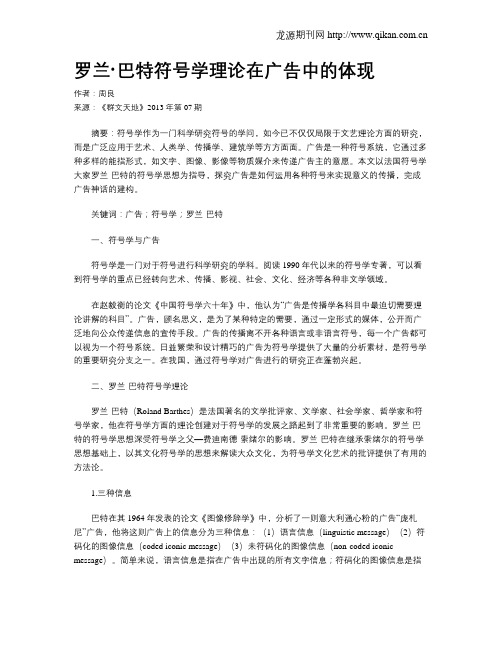
罗兰·巴特符号学理论在广告中的体现作者:周良来源:《群文天地》2013年第07期摘要:符号学作为一门科学研究符号的学问,如今已不仅仅局限于文艺理论方面的研究,而是广泛应用于艺术、人类学、传播学、建筑学等方方面面。
广告是一种符号系统,它通过多种多样的能指形式,如文字、图像、影像等物质媒介来传递广告主的意愿。
本文以法国符号学大家罗兰·巴特的符号学思想为指导,探究广告是如何运用各种符号来实现意义的传播,完成广告神话的建构。
关键词:广告;符号学;罗兰·巴特一、符号学与广告符号学是一门对于符号进行科学研究的学科。
阅读1990年代以来的符号学专著,可以看到符号学的重点已经转向艺术、传播、影视、社会、文化、经济等各种非文学领域。
在赵毅衡的论文《中国符号学六十年》中,他认为“广告是传播学各科目中最迫切需要理论讲解的科目”。
广告,顾名思义,是为了某种特定的需要,通过一定形式的媒体,公开而广泛地向公众传递信息的宣传手段。
广告的传播离不开各种语言或非语言符号,每一个广告都可以视为一个符号系统。
日益繁荣和设计精巧的广告为符号学提供了大量的分析素材,是符号学的重要研究分支之一。
在我国,通过符号学对广告进行的研究正在蓬勃兴起。
二、罗兰·巴特符号学理论罗兰·巴特(Roland Barthes)是法国著名的文学批评家、文学家、社会学家、哲学家和符号学家,他在符号学方面的理论创建对于符号学的发展之路起到了非常重要的影响。
罗兰·巴特的符号学思想深受符号学之父—费迪南德·索绪尔的影响。
罗兰·巴特在继承索绪尔的符号学思想基础上,以其文化符号学的思想来解读大众文化,为符号学文化艺术的批评提供了有用的方法论。
1.三种信息巴特在其1964年发表的论文《图像修辞学》中,分析了一则意大利通心粉的广告“庞札尼”广告,他将这则广告上的信息分为三种信息:(1)语言信息(linguistic message)(2)符码化的图像信息(coded iconic message)(3)未符码化的图像信息(non-coded iconic message)。
罗兰·巴特符号学视角下的符号意指过程研究

罗兰·巴特符号学视角下的符号意指过程研究发表时间:2020-12-23T15:01:33.493Z 来源:《文化研究》2020年11月上作者:赵昕[导读] 符号学是一门研究生课程,罗兰巴特的符号学强调意指过程也就是意义的出现,罗兰巴特在前人的基础上建立了二级符号意指系统。
韩国大邱大学赵昕 116000摘要:符号学是一门研究生课程,罗兰巴特的符号学强调意指过程也就是意义的出现,罗兰巴特在前人的基础上建立了二级符号意指系统。
在这个系统中能指找到所指以后,还要进行更大的能指转化,使二级符号系统通过语言结构的变化,产生新的社会文化意义。
关键词:罗兰巴特符号学;符号意指;过程研究前言罗兰巴特一生留下了大量的研究专著,创作于上世纪50-60年代的两部符号学经典作品奠定了他作为符号学家的基础,也可以作为符号学的基础理论。
巴特的符号学强调意义的出现过程,这个过程不仅涉及到能指和所指的问题还要上升到意指系统进行研究。
1.意指实践的理论基础在语言学研究范围中一个重要的研究课题就是对意义的研究,如果把意义作为人们认识世界的前提和工具,那么人们对世界的认识是什么呢?为了回答这个问题要研究语言和社会之间的动态关系。
极端心理主义和行为主义认为意义只是一个简单的词和物之间的联系,但是哲学语言派对这个问题持不同的意见,他们从另外的切入点来分析这个问题,他们通过研究语言的规律,建立了一套科学的人工语言具有稳定的语言结构以此来探讨对意义解释不清的问题。
这种对意义的思考是对话语和语境的研究,语言和话语不仅能反映当前的社会状态还可以构建一个全新的社会环境。
语言符号不再是得到意义的作用,成为获取知识的工具,符号也不再成为意义和现实之间的媒介,意义所研究的内容是符号的社会和文化属性问题。
结构主义的方法和原则,是索绪尔研究语言系统的一个新方法,巴特是一位来自法国的结构主义学家,他早期的理论受到索绪尔的影响很大。
他对符号学的研究也很注重意义的产生。
罗兰·巴特的符号学理论探析

硕士电子版论文保密级别内部学位级别文学硕士论文提交日期:2002年5月论文答辩日期:2002年6月论文中文题名:罗兰・巴特的符号学理论探析论文英文题名:The Exploration of Roland Barthes’sSemiotics Theory 作者及所在单位:张青岭吉林大学文学院指导教师及所在单位:张德厚吉林大学文学院教授分类标识:B83—064中文主题标识:罗兰・巴特 符号学 神话 英文主题标识:Roland Barthes Semiotics Myth 中文文摘:前言在英语中,符号学有两种称谓:semiology 和 semiotics。
前者由瑞士语言学家索绪尔提出:“我们可以设想有一门研究社会中符号生命的科学;它将构成社会心理学的一部分,因而也是普通心理学的一部分;我们管它叫符号学。
它将告诉我们符号是由什么构成的,受什么规律支配。
……语言学不过是这门一般科学的一部分,将来符号学发现的规律也可以应用于语言学,所以后者将属于全部人文事实中的一个非常确定的领域。
”[1] 后者为美国学者皮尔士(Peirce)创立,“我认为我已表明,逻辑学在一般意义上只是符号学的别名,是符号的带有必然性的或形式的学说”。
[2](在符号学的发展中,二人的思想已交汇。
)国内将二者均译作符号学。
[3]在二十世纪六十年代之前,符号学只是一种设想,后来,人类学家、文学批评家和其他研究者受到语言学家的影响,设法从其观点中受益,于是发展了索绪尔早先假定的符号学科学。
[4] 关于符号学的定义,目前学界尚无定论,一般认为,符号学是从现代语言学模式引申而出的,关于人类符号活动的一般规律的总的学科(或研究领域),它主要研究意义的产生、传达和诠释过程。
六十年代以后,符号学又有了新的发展,几乎覆盖了人文科学的各个领域。
罗兰・巴特(Roland Barthes)是结构主义符号学最早的拥护者,1977年,他也是以“文学符号学”家的身份登上法兰西学院的讲台的,虽然巴特在就职演讲中强调说,他个人的符号学与他曾促进过的那门符号学科相比,是颇带随意性的,如果说不是正相对立的话。
符号学原理解读洪荒之力

文化长廊符号学原理解读洪荒之力李玉洁 西北师范大学摘 要:随着第三十一届奥运会的落幕,大量新词新句浮现在人们的视线中。
其中,“洪荒之力”格外抢眼。
本文就以罗兰•巴特的符号学原理为理论基础来分析和探究“洪荒之力”的符号学含义。
关键词:罗兰•巴特;符号学;洪荒之力[中图分类号]:H08 [文献标识码]:A[文章编号]:1002-2139(2017)-08-192-011、洪荒之力的由来在第三十一届夏季奥林匹克运动会上,中国选手傅园慧在仰泳半决赛中排名,赛后采访傅园慧表示:“我已经用了洪荒之力啦!”第二天决赛后在不知道得奖情况时,傅园慧自嘲道,“我昨天把洪荒之力用完了。
”自此,“洪荒之力”不仅在现实生活中人尽皆知,而且在网络流行语中迅速蹿红,成为语言学界研究的一匹黑马。
“洪荒”一词其实早就存在。
《千字文》一开篇就是“天地玄黄,宇宙洪荒。
”“洪”,指“大”;“荒”指“荒芜”,就是指世界之大,人迹罕见。
《现代汉语词典》中将其解释为“混沌蒙昧的状态”。
传说天地初开之时,曾经有过一次大洪水,几乎毁灭了整个世界。
所以,“洪荒之力”指的就是如天地初开之时这种足以毁灭世界的力量[1]。
2、符号学解读罗兰•巴特运用“语言加上言语就是语言结构”这样一个公式揭开并阐述了语言、言语和语言结构之间的关系[2]。
他认为,语言结构是一种社会性的制度系统,也是一种价值系统。
一方面,语言系统掌控及规范着语言的社会性,因为语言系统是一个民族集体的契约,是约定俗成的,不会因为个体的意志而改变。
所以生活在社会集体中的人,必须遵循语言规则的制约。
罗兰•巴特认为,价值就是依照大众的习惯和普遍同意而存在,所以语言价值一定是由大众集体来确定的,而且符号存在的意义正是它在社会中的文化性,而文化性就是社会集体性中的一种表现。
“洪荒”自古就在《千字文》中出现,《辞源》、《辞海》中也早有该词的解释。
这个词的出现就是中国社会中集体的结晶,大众在秉持遵循共同契约的条件下创造出来,并为大众所普遍接受,也依照大众的习惯。
[罗兰·巴特]罗兰·巴尔特:罗兰·巴尔特
![[罗兰·巴特]罗兰·巴尔特:罗兰·巴尔特](https://img.taocdn.com/s3/m/f92dd993b8d528ea81c758f5f61fb7360b4c2b2c.png)
[罗兰·巴特]罗兰·巴尔特:罗兰·巴尔特篇一: 罗兰·巴尔特:罗兰·巴尔特-一、生平著述,罗兰·巴尔特-二、符号研究在当代符号学研究方面,罗兰·巴尔特大概是最为人所熟知的。
他的名望一方面来自他那些新颖独到的符号学思想,另一方面也在于他用符号透视眼光对大量社会现象所做的解析,其中特别值得我们重视的,是他对许多有关大众文化和大众传播问题的符号学论述。
罗兰·巴尔特在当代符号学研究方面,罗兰·巴尔特大概是最为人所熟知的。
他的名望一方面来自他那些新颖独到的符号学思想,另一方面也在于他用符号透视眼光对大量社会现象所做的解析,其中特别值得我们重视的,是他对许多有关大众文化和大众传播问题的符号学论述。
巴尔特_罗兰·巴尔特-一、生平著述罗兰·巴尔特,是法国当代杰出的思想家和符号学家。
就其思想对人类的贡献而言,美国文艺理论家苏珊·桑塔格在其所编《巴尔特文选》里的一段话可谓盖棺之论:“在二次大战后从法国涌现的所有思想界的大师中,我敢绝对肯定地说,罗兰·巴尔特是将使其著作永世长存的一位。
”至于他在符号学上的崇高声望则以一件事最为突出,那就是1976年仅有学士学位的巴尔特在福柯的推荐下,成为法国最高学府法兰西学院第一位文学符号学的讲座教授。
在那倍显荣耀的就职仪式上,他侃侃而谈:我们“单纯的”现代人把权势看成是1种有些人拥有、有些人不拥有的东西。
我们曾经认为权势是1种典型的政治现象;现在我们则相信它也是1种意识形态现象……于是我们发现权势出现于社会交流的各种精巧的机构中,不只是在国家、阶级、集团里,而且也在时装、舆论、演出、游乐、运动、新闻、家庭和私人关系中,甚至在那些企图对抗权势的解放冲动中……在人类长存的历史中,权势于其中寄寓的东西就是语言,或者再准确些说,是语言的必不可少的部分:语言结构……说话,或更严格些说发出话语,这并非像人们经常强调的那样是去交流,而是使人屈服:全部语言结构是1种普遍化的支配力量。
巴特
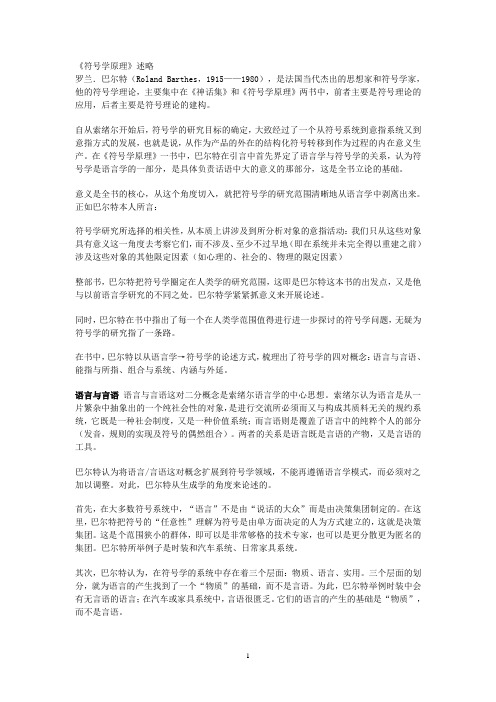
《符号学原理》述略罗兰.巴尔特(Roland Barthes,1915——1980),是法国当代杰出的思想家和符号学家,他的符号学理论,主要集中在《神话集》和《符号学原理》两书中,前者主要是符号理论的应用,后者主要是符号理论的建构。
自从索绪尔开始后,符号学的研究目标的确定,大致经过了一个从符号系统到意指系统又到意指方式的发展,也就是说,从作为产品的外在的结构化符号转移到作为过程的内在意义生产。
在《符号学原理》一书中,巴尔特在引言中首先界定了语言学与符号学的关系,认为符号学是语言学的一部分,是具体负责话语中大的意义的那部分,这是全书立论的基础。
意义是全书的核心,从这个角度切入,就把符号学的研究范围清晰地从语言学中剥离出来。
正如巴尔特本人所言:符号学研究所选择的相关性,从本质上讲涉及到所分析对象的意指活动:我们只从这些对象具有意义这一角度去考察它们,而不涉及、至少不过早地(即在系统并未完全得以重建之前)涉及这些对象的其他限定因素(如心理的、社会的、物理的限定因素)整部书,巴尔特把符号学圈定在人类学的研究范围,这即是巴尔特这本书的出发点,又是他与以前语言学研究的不同之处。
巴尔特学紧紧抓意义来开展论述。
同时,巴尔特在书中指出了每一个在人类学范围值得进行进一步探讨的符号学问题,无疑为符号学的研究指了一条路。
在书中,巴尔特以从语言学→符号学的论述方式,梳理出了符号学的四对概念:语言与言语、能指与所指、组合与系统、内涵与外延。
语言与言语语言与言语这对二分概念是索绪尔语言学的中心思想。
索绪尔认为语言是从一片繁杂中抽象出的一个纯社会性的对象,是进行交流所必须而又与构成其质料无关的规约系统,它既是一种社会制度,又是一种价值系统;而言语则是覆盖了语言中的纯粹个人的部分(发音,规则的实现及符号的偶然组合)。
两者的关系是语言既是言语的产物,又是言语的工具。
巴尔特认为将语言/言语这对概念扩展到符号学领域,不能再遵循语言学模式,而必须对之加以调整。
罗兰·巴特城市符号学观点

罗兰·巴特城市符号学观点
罗兰·巴特(Roland Barthes,公元1915年11月12日—公元1980年3月26日),法国作家、思想家、社会学家、社会评论家和文学评论家。
出生于法国下诺曼底大区,逝世于法国法兰西岛,享年64岁。
早期的著作在阐述语言结构的随意性及对大众文化的一些现象提供类似的分析。
在《神话学》(Mythologies, 1957)书中分析大众文化。
《论拉辛》(On Racine, 1963)在法国文学界造成轰动,使他成为敢与学院派权威相抗衡的人物。
他后来有关符号学的作品包括较激进的《S/Z》(S/Z, 1970)、研究日本而写成的《符号帝国》(The Empire of Signs, 1970),以及其他一些重要的作品使他的理论在1970年代受到广大的注目,并在20世纪有助于把结构主义建立为一种具领导性的文化学术运动。
1976年在法兰西学院担任文学符号学讲座教授,成为这个讲座的第一位学者。
旅游符号学的理论述评和研究内容

旅游符号学的理论述评和研究内容一、本文概述旅游符号学是一门跨学科的研究领域,结合了符号学、旅游学、文化学等多个学科的理论与方法,旨在探讨旅游现象中的符号及其意义生成、传播与解读的过程。
本文旨在对旅游符号学的理论进行系统的述评,梳理其研究内容,以期推动该领域的深入研究与实践应用。
我们将回顾旅游符号学的发展历程,明确其学科定位与研究范畴。
接着,我们将介绍旅游符号学的基本理论框架,包括符号的定义、分类及其在旅游领域中的应用。
在此基础上,本文将重点分析旅游符号学的核心研究内容,如旅游符号的识别与解读、旅游符号的意义生成与传播、旅游符号与文化认同等。
我们将对旅游符号学的研究方法进行探讨,以期为该领域的未来发展提供有益的参考。
二、旅游符号学理论述评旅游符号学作为一门新兴的交叉学科,融合了符号学、旅游学、文化学等多学科的理论与方法,旨在探讨旅游现象中的符号表征、意义传达以及文化交流等问题。
自20世纪70年代以来,旅游符号学逐渐受到学者们的关注,其理论框架和研究内容不断丰富和发展。
在理论述评方面,旅游符号学主要关注旅游符号的构成、意义生成与解读过程。
旅游符号的构成包括语言符号和非语言符号两大类。
语言符号如旅游广告、导游讲解等,通过文字和语言传递旅游目的地的信息;非语言符号如建筑、风景、服饰等,通过视觉、听觉等感官体验传达旅游地的文化特色。
这些符号在旅游过程中相互作用,共同构建旅游者的旅游体验。
在意义生成方面,旅游符号学强调符号与旅游者之间的互动关系。
旅游符号不仅是信息的载体,更是意义的生成者。
旅游者通过解读旅游符号,获得对旅游目的地的认知和理解,从而生成个性化的旅游体验。
同时,旅游符号的意义并非固定不变,而是随着时代、文化、社会背景等因素的变化而不断演变。
在解读过程方面,旅游符号学注重旅游者的主体性和参与性。
旅游者作为旅游符号的接收者和解读者,其文化背景、审美趣味、个体经验等因素都会影响对旅游符号的解读。
因此,旅游符号学强调旅游者的主体性和参与性,认为旅游者的解读过程是一个主观与客观相结合的过程。
罗兰·巴特的符号学体系与叙事转向

罗兰·巴特的符号学体系与叙事转向当前,学界主要从社会及其思潮的转变来探讨叙事转向的原因。
这种社会诊断揭示了叙事转向的外部原因,能够充分说明叙事转向前后的“不同”,但不能很好地说明转向前后的“联系”。
因此,有必要从叙事理论内部对叙事转向进行探讨,以揭示转向前后的有机联系。
罗兰·巴特的符号学理论提供了这种观照视角,元语言符号学到含蓄意指符号学的转变反映了叙事转向的内在逻辑。
元语言符号学局限于文本本身的意指关系,而含蓄意指符号学则指向文本之外的世界,其所指是意识形态的一部分。
这两种符号学与叙事研究的两种方式具有一种对应关系。
同时,罗兰·巴特关于两种元语言的论述不仅包容了社会诊断,而且给叙事研究带来了多方面的启示。
20世纪80年代,随着经典叙事学到后经典叙事学的转变,叙事研究的方法、模式以及核心范畴都发生了改变。
与经典叙事学相比,后经典叙事学并没有发生所谓的断裂,也不是前者的继续,而是研究方法和思维模式发生了一定的变化。
那么,叙事转向的原因何在?关于叙事转向有各种不同的说法,如语境转向、接受转向、空间转向、修辞转向、反本转向等,这些“转向”将转向的原因主要归于社会转型或社会思潮的转变——如解构主义、后结构主义、后现代主义等。
笔者在此将这种诊断称为社会诊断,即从社会及其思潮的转变来看待叙事转向。
这种社会诊断模式有其合理性,也道出了叙事转向的重要原因。
但这只是原因的一个方面,即外部原因,它不能从叙事理论内部来透视叙事研究的转变。
或者说,社会诊断能够充分说明叙事转向前后的“不同”,但不能很好地说明转向前后的“联系”。
因此,有必要从叙事理论内部对叙事转向进行探讨,以揭示转向前后的有机联系。
本文试图从罗兰·巴特的符号学理论出发,探讨叙事转向的“内部原因”,并由此说明叙事研究的嬗变过程。
可以看出,罗兰·巴特在这里指出了两种元语言,其中一种新元语言“说着”另一种元语言。
经典文本罗兰巴特第二层级符号学

罗兰·巴尔特是法国著名的符号学家,他对符号学的研究以及其对文本解读的影响至今仍然被广泛讨论。
本文将对巴尔特的经典文本进行深入解析,以期更好地理解他的符号学观点。
一、巴尔特的符号学观点1. 巴尔特的符号学理论基础巴尔特认为,符号学是一门解释文本的方法论,通过解读文本中的符号来理解作者的意图和文本所表达的含义。
他强调符号的重要性,认为符号是文本表达和传达意义的主要途径。
2. 巴尔特的符号学观点巴尔特在其著作《房间、时钟、照片》中详细阐述了他的符号学观点。
他认为,文本中的符号并非单纯的象征,而是具有多重意义和隐喻,需要通过符号学的方法进行解读和理解。
二、巴尔特的符号学方法1. 符号的多重意义巴尔特认为,符号不仅有直接的意义,还可能具有隐喻和象征的意义。
他通过对文本中符号的深入解读,揭示了符号背后的多重意义和符号之间的内在联系。
2. 符号的文化背景巴尔特强调符号的文化背景对其意义的塑造和解读起着重要作用。
他主张符号不是脱离文化和历史环境的,而是受到文化影响和历史沉淀的产物。
三、巴尔特的符号学对文本解读的影响1. 对文本解读方法的启示巴尔特的符号学观点对文本解读方法产生了深远的影响。
他提出了符号学方法,使人们更深入地理解和解读文本,开拓了对文本的新理解方式。
2. 对文本研究的推动巴尔特的符号学观点促进了文本研究的发展。
他的学术观点为学者们提供了新的研究思路和方法,推动了文本研究的深入和广泛发展。
四、巴尔特符号学的现实意义1. 对文化交流的影响巴尔特的符号学观点为文化交流提供了更多的研究思路和解读方法。
通过对符号的深入理解和探讨,可以更好地促进不同文化之间的交流和理解。
2. 对文本解读的启示巴尔特的符号学观点对文本解读具有重要的启示意义。
他的研究方法为文本解读提供了更多的可能性,鼓励人们深入思考和探讨文本中的符号和意义。
在总结中,巴尔特的符号学观点具有重要的理论意义和实际意义。
他的研究方法和观点为文本解读和研究提供了新的思路和方法,对文化交流和文本解读都产生了深远的影响。
修辞与意识形态——罗兰·巴特符号学思想探析
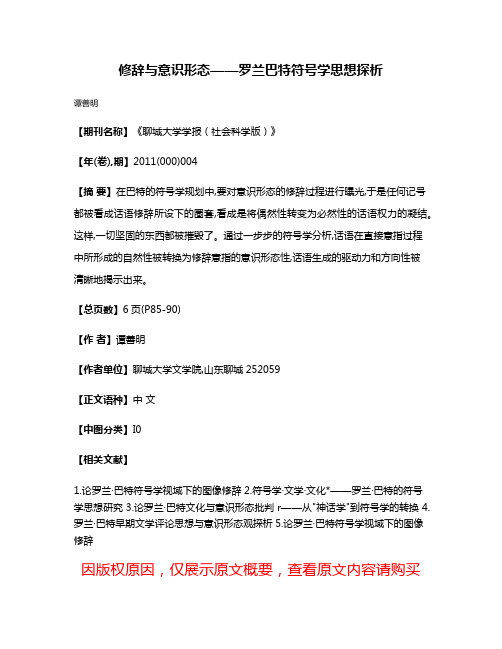
修辞与意识形态——罗兰巴特符号学思想探析
谭善明
【期刊名称】《聊城大学学报(社会科学版)》
【年(卷),期】2011(000)004
【摘要】在巴特的符号学规划中,要对意识形态的修辞过程进行曝光,于是任何记号都被看成话语修辞所设下的圈套,看成是将偶然性转变为必然性的话语权力的凝结。
这样,一切坚固的东西都被摧毁了。
通过一步步的符号学分析,话语在直接意指过程
中所形成的自然性被转换为修辞意指的意识形态性,话语生成的驱动力和方向性被
清晰地揭示出来。
【总页数】6页(P85-90)
【作者】谭善明
【作者单位】聊城大学文学院,山东聊城252059
【正文语种】中文
【中图分类】I0
【相关文献】
1.论罗兰·巴特符号学视域下的图像修辞
2.符号学·文学·文化*——罗兰·巴特的符号
学思想研究3.论罗兰·巴特文化与意识形态批判r——从"神话学"到符号学的转换4.罗兰·巴特早期文学评论思想与意识形态观探析5.论罗兰·巴特符号学视域下的图像修辞
因版权原因,仅展示原文概要,查看原文内容请购买。
- 1、下载文档前请自行甄别文档内容的完整性,平台不提供额外的编辑、内容补充、找答案等附加服务。
- 2、"仅部分预览"的文档,不可在线预览部分如存在完整性等问题,可反馈申请退款(可完整预览的文档不适用该条件!)。
- 3、如文档侵犯您的权益,请联系客服反馈,我们会尽快为您处理(人工客服工作时间:9:00-18:30)。
英文主题标识:Roland Barthes 中文文摘:
Semiotics
Myth
论文摘要
罗兰·巴特,20 世纪法国重要的思想家、文艺批评家,其符 号学理论具有极强的理论和实践意义,然国内学者对此却鲜有论 述,本文尝试之:
一、结构主义语言学:巴特符号学理论的理论基础和方法论 依据
结构主义语言学指的是以索绪尔、雅各布森、叶尔姆斯列夫、 乔姆斯基等人为代表的现代语言学理论。索绪尔的结构思想以及 一系列概念术语为现代语言学奠定了基础,上述诸人不断努力,
四、巴特符号学理论对当代大众文化研究的意义和局限 巴特将符号学用于大众文化研究,独开大众文化研究的符号 学一派。在西方,巴特的符号学研究方法已融入众多学派之中。 对中国而言,其意义可作如是看:方法借鉴意义和思想解放意义。 其局限表现在:符号学解释在经验上的有效性难以证明;精英主 义立场,看不到大众在神话接受中的反抗力量;形式化倾向,只 注重意义分析,缺乏社会理论基础的支持。 总之,巴特对符号学的贡献有二:一是初步建立了一门符号 科学;二是将符号学用于大众文化分析,显示了符号学强大的社 会批判和阐释力量,后者的意义尤其巨大。巴特的解神话思想会 同福柯、德里达等人,引发了一场后结构主义风暴,在人类思想 史上写下了光辉的一笔。
二、语言乌托邦:巴特符号学理论的理论实质 巴特的符号学理论在 20 世纪西方哲学、美学的语言论转向中 具有严格意义上的语言乌托邦性质。语言乌托邦,本文中,有三 层含义:(1)语言性,语言模式是巴特符号学理论的第一性原理, 他甚至颠覆索绪尔的假设,以符号学为语言学的分支;(2)乌托 邦性,即幻想性,从零度写作到符号学大厦、元语言,均具有浓 郁的理想化色彩;(3)语言乌托邦性,“意为语言性或语言论乌托 邦,亦即符号性或符号论乌托邦。我们用它指 20 世纪西方美学的 语言理想范型崇拜倾向,这意味着关于语言符号、非语言符号或 现代传播媒介问题的探索,被认为是解决美学问题、探索审美和 艺术奥妙的理想途径。” 巴特认为语言和文学是同质的,二者互 为乌托邦。 然而,巴特符号学理论的建构中也包含着解构的力量,庞大 的符号学大厦中隐藏着裂缝,因为语言不仅是乌托邦,也是法西 斯。当巴特对语言的崇拜达到极端时,必然走向它的反面,反语 言,反乌托邦。 三、神话和解神话:巴特符号学理论的社会学主题 “神话”一语,出自巴特的《神话》,巴特从语言学的角度对
完成了语言学上的革命。 巴特符号学理论中处处可见语言学理论的影响。一系列概念、
术语、完全来自语言学,理论体系也是依照语言学的理论体系而 建立,而且巴特用来分析社会中诸现象的符号学方法也来自语言 学。
由是观之,巴特的符号学理论完全建基在结构主义语言学理 论之上,继承了结构主义语言学的优缺点:形式性、科学性、可 操作性和非历史性。
Because Barthes’s semiotics imperial is completely based on structuralist linguistics, it has the advantages and disadvantages of Structuralism linguistics, for example, formality, scientificity, practicality and contrary to history.
Part two: linguistic utopia: the essence of Barthes’s semiotics theory.
Barthes’s semiotics theory appears clearly linguistic utopia nature in the linguistic turn of 20th in west philosophy and aesthetics. Linguistic utopia has three meanings: I Language nature. Linguistic model is the first principle of barthes’s semiotics theory, further more, he overturned Saussure’s view and advocated semiotics is a branch of linguistics. II Utopia nature. From ‘zero writing’to sign imperial and meta- language, all of his semiotics thoughts are charged with idealism. III Linguistic utopia nature. As Mr.wang Yichuan said, ‘it means language or linguistic utopia nature, or sign utopia, we use it to signify the worship tendency to linguistic model in west aesthetics of 20th century, which implies that the exploration about linguistic, nonlinguisticsign or modern media is considered as an ideal way to resolve the problems of aesthetics and art.’ Barthes considered literature is the utopia of language, and language is the utopia of literature, and language and literature is identical in essence.
英文文摘
ABSTRACT
Roland Barthes is a well-known thinker and literary critic of France in 20th century, and his semiotics theory has profound theoretic and practical significance. But in China few of people spend their time on the study of Roland Barthes’s semiotics theory, the author intends to try on it:
硕士电子版论文
保密级别 内部
学位级别 文学硕士
论文提交日期:2002 年 5 月
论文答辩日期:2002 年 6 月 论文中文题名:罗兰·巴特的符号学理论探析
论 文 英 文 题 名 :The Exploration of Roland Barthes’s
Semiotics Theory
作者及所在单位:张青岭 吉林大学文学院 指导教师及所在单位:张德厚 吉林大学文学院教授 分类标识:B83—064 中文主题标识:罗兰·巴特 符号学 神话
Part one: Structuralism linguistics: the basis of theory and methodology of Barthes’s semiotics theory
Structuralism linguistics refers to modern linguistics theory represented by the following linguists such as Saussure, Jakobson, Hjelmslev, Chomsky, Benveniste etc. Saussure’s structural thought and a series of concepts based a basis for modern linguistics. Under his influence, the above- mentioned figures accomplished a revolution in linguistics, and the revolution affected other disciplines.
Part three: Myth and Demythfication: the sociology theme of Barthes’s semiotics theory.
The term Myth is originated from Mythologies. From the angle of linguistics, Barthes identified as follows: firstly, Myth is a parole, a message, and it is not identified by the message itself but the way it is said; secondly, Myth is a sign system which is made of two arrangements, one of them is the signifier of the other. Further more, Barthes regarded Myth as ‘parole depolitization’, so the term
其做了界定:首先,神话是一种言谈,一种讯息,它不是由讯息 的客体而是由说出讯息的方式来定义的;其次,从意义构成的角 度看,神话是一个二级符号系统,“其中一个系统成为另一个系统 的能指”。巴特还指出,神话是一个“去政治化的言谈”,因此,“解 神话”在巴特那里首先是,指出资产阶级如何以匿名的方式将自 己的意识形态强加于所有社会阶层之上;推而广之,“解神话”就 是指出神话的运作方式以破除迷思。
Barthes’s semiotics theory is filled with linguistics traces. Firstly, a series of terminology in it are come from Structuralism linguistics; Secondly, the system of barthes’s semiotics is completely based on Structuralism linguistics; Lastly, the method barthes using to analyses social signs results from linguistics.
